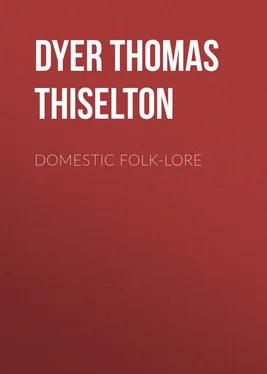Thomas Dyer - Domestic folk-lore
Здесь есть возможность читать онлайн «Thomas Dyer - Domestic folk-lore» — ознакомительный отрывок электронной книги совершенно бесплатно, а после прочтения отрывка купить полную версию. В некоторых случаях можно слушать аудио, скачать через торрент в формате fb2 и присутствует краткое содержание. Жанр: foreign_antique, foreign_prose, на английском языке. Описание произведения, (предисловие) а так же отзывы посетителей доступны на портале библиотеки ЛибКат.
- Название:Domestic folk-lore
- Автор:
- Жанр:
- Год:неизвестен
- ISBN:нет данных
- Рейтинг книги:4 / 5. Голосов: 1
-
Избранное:Добавить в избранное
- Отзывы:
-
Ваша оценка:
- 80
- 1
- 2
- 3
- 4
- 5
Domestic folk-lore: краткое содержание, описание и аннотация
Предлагаем к чтению аннотацию, описание, краткое содержание или предисловие (зависит от того, что написал сам автор книги «Domestic folk-lore»). Если вы не нашли необходимую информацию о книге — напишите в комментариях, мы постараемся отыскать её.
Domestic folk-lore — читать онлайн ознакомительный отрывок
Ниже представлен текст книги, разбитый по страницам. Система сохранения места последней прочитанной страницы, позволяет с удобством читать онлайн бесплатно книгу «Domestic folk-lore», без необходимости каждый раз заново искать на чём Вы остановились. Поставьте закладку, и сможете в любой момент перейти на страницу, на которой закончили чтение.
Интервал:
Закладка:
"And it ne'er will be cured by doctor on earth,
Tho' every one should tent him, oh!
He shall tremble and die like the elf-shot eye,
And return from whence he came, oh!"
There is, however, a remedy, though not easy of attainment – "It lies in the wearing a sark, thus prepared: – The lint must be grown in a field which shall be manured from a farmyard heap that has not been disturbed for forty years. It must be spun by Habbitrot, the queen of spinsters; it must be bleached by an honest bleacher, in an honest miller's mill-dam, and sewed by an honest tailor. On donning this mysterious vestment, the sufferer will at once regain his health and strength." Unfortunately the necessary conditions for the successful accomplishment of this charm are so difficult, that he must be a clever man who can fulfil them. In the South of England, on the other hand, we do not find the same dread attaching to the graves of still-born children. Thus on a certain occasion, when one of the Commissioners of Devonport complained that a charge of one shilling and sixpence should have been made upon the parish authorities for the grave and interment of a still-born child, he added that "when he was a young man it was thought lucky to have a still-born child put into an open grave, as it was considered to be a sure passport to heaven for the next person buried there." According to another superstitious notion, if a mother frets and pines after her baby when it is dead, it is said that it cannot rest, and will come back to earth again. Various stories are on record of children thus visiting their mothers after death, an instance of which we quote from the "Dialect of Leeds: " – It appears that soon after the birth of the mother's next child, the previous one that had died entered her room with eyes deeply sunken, as if with much weeping, and on approaching the bed, said, "Mother, I can't rest if you will go on fretting." She replied, "Well, lad, I wean't fret any more." He then looked upon the bed and said, "Let's luke at it, mother!" She turned down the coverlet and let him look at her new-born babe. "It'll die," he said, and vanished. These, then, are some of the boundless dangers and difficulties that are supposed to beset the beginnings of life; and, taking into consideration the importance of that momentous crisis, when a fresh actor is introduced upon the world's great stage, it is not surprising that this event has, in most ages and countries, been associated with divers superstitions, and given rise to sundry customs, each of which has helped to invest man's entry into this world with all that grandeur which such a solemn occasion requires.
CHAPTER II
CHILDHOOD
Nursery Literature – The Power of Baptism – Confirmation – Popular Prayers – Weather Rhymes – School Superstitions – Barring out.
It must not be supposed that childhood has no special folk-lore of its own. It is, in fact, of a most varied kind, many of the old traditionary beliefs and practices associated with the nursery being relics of what the Scandinavian mothers taught their children in days of long ago. The familiar fairy-tales of our own childhood still form the nursery literature in most homes, and are of unusual interest as embodying not only the myths and legends of the ancient Aryan race, but their conceptions about the world around them. Thus, for instance, the well-known story of "Cinderella," like many others of the same character, such as "Jack the Giant Killer," or "Beauty and the Beast," are to be found in almost all countries, and although the versions differ in some respects, yet they point to a common origin at a very remote period. Indeed, it is curious that there should still exist among the children of the nineteenth century an undying love for these survivals of Aryan literature, couched in such graceful and simple language that few modern compositions can be found to equal them. In reading, therefore, about the dwellers in Wonderland, the young mind is unconsciously taking in primitive notions about the workings of nature as seen in the succession of day and night, the changes of the seasons, and so on. In the story of "Cinderella," we have the ancient nature-myth of the sun and the dawn, representing the morning sun in the form of a fairy prince pursuing Cinderella, the dawn, to claim her for his bride, whilst the envious clouds, her sisters, and the moon, her stepmother, strive to keep her in the background. It would, however, take too long and require a book of itself to discuss the history and meaning of these fairy tales which so delight the childish fancy, and exercise such a wholesome influence, inculcating some of the noblest sentiments and loftiest teachings of the founders of our race. Referring then more particularly to the superstitions connected with childhood, we would, first of all, briefly speak of those relating to certain outward circumstances, which are believed to affect more or less the child's welfare in life.
Thus, it is a deep-rooted belief that a child never thrives until after its baptism; and in cases of illness the clergyman is more often perhaps sent for by the poor from a belief in the physical virtue of the sacred rite itself, rather than from any actual conviction of its religious importance. Indeed, how much potency is supposed to reside in baptism may be gathered from the countless superstitions with which it is associated, the omission of this rite being attended more often than not with fatal results. Hence it is frequently performed as soon as possible after birth, one reason being, as we have already seen, that so long as the child remains unbaptised it is thought to be at the mercy of ill-disposed fairies, and subject to the influence of the evil eye. According to another popular fancy, not confined to our own country, should a child have the misfortune to die unchristened, it is doomed either to flit restlessly around its parents' abode, or to wander about in deserted spots, daily repining over its hard and unenviable lot. In Germany, tradition says that such children are transformed into that delusive little meteor known as the will-o'-the-wisp, and so ceaselessly hover between heaven and earth. On one occasion, we are told of a Dutch parson who, happening to go home to his village late one evening, fell in with no less than three of these fiery phenomena. Remembering them to be the souls of unbaptised children, he solemnly stretched out his hand and pronounced the words of baptism over them. Much, however, to his terrible consternation and surprise, in the twinkling of an eye a thousand or more of these apparitions suddenly made their appearance – no doubt all equally anxious to be christened. The good man, runs the story, was so terribly frightened, that forgetting all his good intentions, he took to his heels and ran home as fast as his legs could take him. In Lusatia, where the same superstition prevails, the souls of these unhappy children, which hover about in the form of will-o'-the-wisps, are said to be relieved from their unhappy wanderings so soon as any pious hand throws a handful of consecrated ground after them.
In Scotland, to make quite sure of baptism being altogether propitious, it was deemed highly important that the person entrusted with the care of the child should be known by common report to be lucky. She was generally provided with a piece of bread and cheese, which she presented to the first person she met as an offering from the infant. If the party readily accepted and partook of the proffered gift, it was undoubtedly a good omen; but if refused it was considered tantamount to wishing evil to the child. Hence the future destiny of the little one was often augured from this superstitious ceremony, which, by-the-by, is also practised in the West of England, but the events of its after-life only too often belied the weal and woe predicted for it. Again, it is thought highly necessary that the child should cry at its baptism, or else ill-luck will sooner or later overtake it, the idea being that, when the child screams and kicks, the evil spirit is in the act of quitting it; its silence, on the other hand, indicating that it is too good for this wicked world. An amusing little episode in illustration of this curious superstition is related by Mrs. Latham, in the "Folk-lore Record: " – "I was lately present at a christening in Sussex, when a lady of the party, who was grandmother of the child, whispered in a voice of anxiety, 'The child never cried; why did not the nurse rouse it up?' After we had left the church she said to her, 'O nurse, why did not you pinch baby?' And when the baby's good behaviour was afterwards commented upon, she observed, with a very serious air, 'I wish that he had cried.'" In the same county it is considered unlucky to divulge a child's intended name before its baptism; and the water sprinkled on its forehead at the font must on no account be wiped off. Whilst on the subject of baptism, we would just note that in former years peculiar curative properties were supposed to reside in water that had been used at this rite, and on this account it was employed for various disorders. It was also regarded in Scotland as a preservative against witchcraft; and eyes bathed in it were rendered for life incapable of seeing ghosts.
Читать дальшеИнтервал:
Закладка:
Похожие книги на «Domestic folk-lore»
Представляем Вашему вниманию похожие книги на «Domestic folk-lore» списком для выбора. Мы отобрали схожую по названию и смыслу литературу в надежде предоставить читателям больше вариантов отыскать новые, интересные, ещё непрочитанные произведения.
Обсуждение, отзывы о книге «Domestic folk-lore» и просто собственные мнения читателей. Оставьте ваши комментарии, напишите, что Вы думаете о произведении, его смысле или главных героях. Укажите что конкретно понравилось, а что нет, и почему Вы так считаете.












